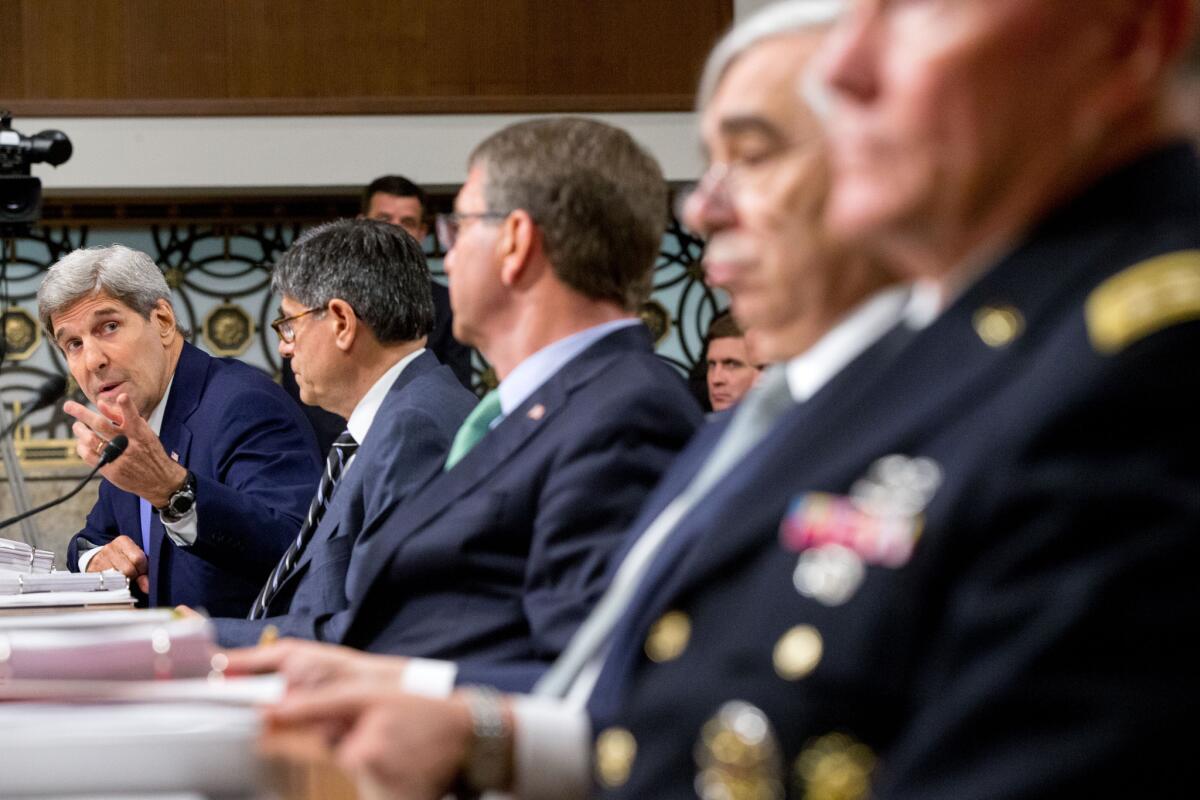Opinion: How Obama might keep the Iran deal alive if Congress votes no

Secretary of State John Kerry, left, testifies on Capitol Hill in Washington, Wednesday, July 29, before the Senate Armed Services Committee hearing, on the impacts of the Joint Comprehensive Plan of Action (JCPOA). From left are, Kerry, Treasury Secretary Jacob Lew, Defense Secretary Ash Carter, Energy Secretary Ernest Moniz, and Joint Chiefs Chairman Gen. Martin Dempsey.
- Share via
Reporting from Washington — In my column on Wednesday, I listed conservatives’ proposed alternatives to President Obama’s nuclear agreement with Iran. Contrary to what some officials have said, options other than war do exist; they’re just not likely to work.
Here’s one more intriguing possibility: If Congress votes to reject the deal, Obama could still comply with some parts of it.
This scenario was suggested by Robert Satloff of the Washington Institute for Near East Policy in a recent column for Politico. Satloff noted that Congress can’t actually cancel the nuclear deal; it can merely prohibit the president from lifting U.S. sanctions on Iran that were imposed by legislation.
So if Congress votes no and overrides the veto that Obama has promised, the president could still implement some parts of the deal, Satloff wrote. Obama could lift some U.S. sanctions (those imposed by executive action, not legislation). He could even direct the Treasury Department to soft-pedal sanctions enforcement, much as he has directed the Justice Department to defer enforcement of some immigration laws.
Under those circumstances – a kind of halfway-in, halfway-out position for the United States -- Iran might decide to comply with some or all of its obligations under the deal in order to win sanctions relief from other countries. The result would be a diplomatic muddle – and a steadily eroding set of international sanctions.
Satloff told me he wasn’t proposing that as a solution; he was just pointing out that if Congress votes no, the outcome doesn’t need to be a rapid march to war.
But there are at least two problems with that scenario too.
“If the United States says it’s not going to abide by every part of the agreement, Iran isn’t likely to comply,” an administration official argued. “Iran never would have signed up for a deal that imposed restrictions on its nuclear programs but imposed no obligations on the United States.”
Indeed, Iran might argue that it’s no longer bound by the deal’s obligations, but still set out to undermine the international sanctions – in which case pressure on the next president to take military action would increase.
The second problem with a “halfway option” is that the U.S. sanctions that remain in force will still restrain major European countries from doing business with Iran, creating friction between the United States and its allies.
So it’s not a magic solution. But in the (still-unlikely) case that Congress overrides an Obama veto and stops the president from lifting sanctions, it’s an option he may want to consider.
Follow Doyle McManus on Twitter @doylemcmanus and Google+
More to Read
A cure for the common opinion
Get thought-provoking perspectives with our weekly newsletter.
You may occasionally receive promotional content from the Los Angeles Times.











